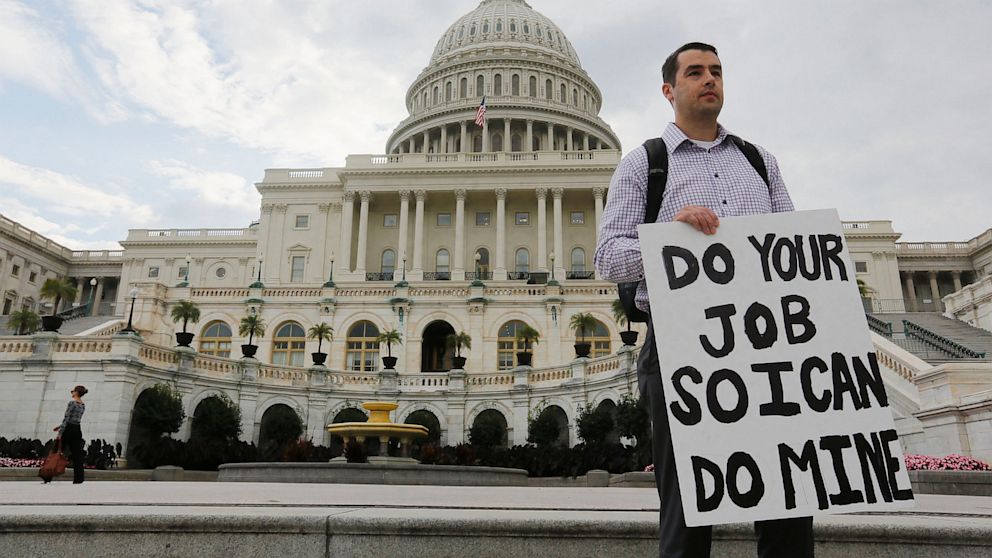 A partial U.S. government shutdown began yesterday, Oct. 1, because Congress could not agree on how to fund federal programs and agencies. The result: a shutdown of most federal agencies, save the Social Security office, U.S. postal service, veterans hospitals, the U.S. military and part of NASA.
A partial U.S. government shutdown began yesterday, Oct. 1, because Congress could not agree on how to fund federal programs and agencies. The result: a shutdown of most federal agencies, save the Social Security office, U.S. postal service, veterans hospitals, the U.S. military and part of NASA.
The House passed a funding bill over the weekend that delayed the Affordable Care Act or Obamacare for one year and repealed a tax on medical devices. The Senate rejected that measure.
The rationale for House Republicans was: delay Obamacare for at least a year to cut government spending and reduce the budget deficit.
They voted several times and still could not come to agreement.
Why does the shutdown come now?
Each year, the House and Senate are supposed to agree on 12 appropriations bills to fund the federal agencies and set spending priorities. According to the Washington Post, "Congress has become bad at passing these bills, so in recent years they've resorted to stopgap budgets to keep the government funded (known as "continuing resolutions").”
The last stopgap passed last March expired on September 30.
Essentially, due to disagreement in bureaucracy and the pain of the legislative process, President Obama had to shutdown the government. It’s the law.
According to The Washington Post, the laws and regulations governing shutdowns separate federal workers into "essential" and "non-essential."
Agencies Remaining Open
- Agencies that ensure National security
- Agencies that protect life and property (eg. Air traffic control, emergency medical care, border patrol, federal prisons, most law enforcement, emergency and disaster assistance, overseeing the banking system, operating the power grid, and guarding federal property)
- Agencies have send out benefits (eg. Social Security checks, veterans' benefits, unemployment, food stamps)
- All agencies with independent sources of funding remain open, including the U.S. Postal Service and the Federal Reserve.
- Members of Congress
About 800,000 federal employees are currently on furlough—leave without pay.
The 1.3 million or so "essential" civilian employees could well see their paychecks delayed during the shutdown, depending on the timing.  They should, however, receive retroactive pay if and when Congress decides to fund their agencies again.
They should, however, receive retroactive pay if and when Congress decides to fund their agencies again.
The 1.4 million active-service military members will get paid no matter how long the shutdown lasts. The House and Senate specifically passed a bill to guarantee active-duty military pay even when the government is closed, which Obama signed into law Monday night.
According to The Washington Post, these are some agencies that have endured full or partial shut down:
- Department of Commerce
- Department of Defense: (No new defense contracts and half of civiliam employees sent home)
- Department of Energy: (Those in charge of nuclear materials and power grids stay. Those conducting energy research sent home)
- Environmental Protection Agency: (Those protecting toxic Superfund sites stay. Pollution and pesticide regulators sent home)
- Department of Health and Human Services: (Those running the Suicide Prevention Lifeline stay, those in charge of investigating Medicare fraud sent home.)
- Department of Housing and Urban Development: (Those in charge of guaranteeing mortgages at Ginnie Mae stay, as would those in charge of homelessness programs)
- Department of Interior: (Wildlife law enforcement officers would stay, while the national parks would close.)
- Department of Justice: (FBI agents, drug enforcement agents, and federal prison employees would stay. The department would continue running background checks for gun sales. Some attorneys sent home)
- Department of Labor: (Mine-safety inspectors stay. Wage and occupational safety regulators sent home)
- NASA: (Scientists working on the International Space Station stay. Many engineers sent home.)
- Social Security Administration: (Claims representatives ay; actuaries would go home.)
- Supreme Court and federal courts.Federal courts, will continue to operate for approximately two weeks with reserve funds. After that, only essential employees would continue to work, as determined by the chief judge, with the rest furloughed. The Supreme Court will continue to operate when it opens Oct. 7, as it did in previous shutdowns)
- Department of Treasury: (Those sending out Social Security checks would stay; IRS employees overseeing audits sent home)
- Department of Transportation: (Air-traffic controllers stay on; most airport inspections cease)
- Department of Veterans Affairs: (Hospital workers stay; some workers in charge of processing benefits sent home)
A few days of this will not have significant effect on the economy. However, the Huffington Post reports that according to Macroeconomic Advisers, a two-week shutdown could lower annual growth rate by 0.3 percentage point.
This is the first government shutdown since President Bill Clinton’s first term.

